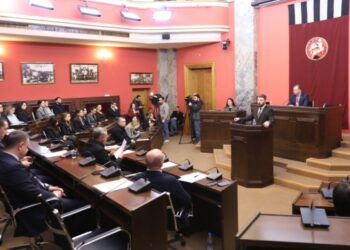With regard to the 1st out of 12 priorities – political polarization, the European Commission says that cooperation, compromise-building and inclusive consultations with opposition parties and civil society, notably with regards to reforms that relate to Georgia’s EU agenda, should be further pursued.
“Most Members of Parliament ended their boycott of Parliament and a few laws were passed with cross-party support. Regular ministers’ question times take place in Parliament with attempts aiming to start cross-party discussion notably on EU-path related reforms.
“Parliament voted against impeaching the President of Georgia. The use of harsh rhetoric continues with incidents of disinformation regarding the EU.
“Cooperation, compromise-building and inclusive consultations with opposition parties and civil society, notably with regards to reforms that relate to Georgia’s EU agenda, should be further pursued. All parties and stakeholders should build on the broad consensus towards Georgia’s European path in line with the will of the vast majority of Georgian citizens”, reads the report.
As for the recommendation regarding the full functioning of all state institutions, the Commission says:
“Amendments to the rules of procedure strengthened parliamentary oversight functions and led to increased ministerial hearings. The use of these oversight prerogatives should be enacted, including by enabling the setting up of parliamentary investigative committees and the participation of opposition parties in the “trust group” overseeing the security services.
“Parliament adopted, in an expedited manner and by later overruling a veto by the President, amendments on the functioning of the National Bank of Georgia which raised concerns in relation to the Bank’s independence.
“The Government adopted a public administration reform strategy and an action plan. Investigations into the large-scale wiretapping revealed in 2021 are still outstanding. Georgia should ensure effective parliamentary oversight, notably of security services, and independence and impartiality of its key institutions.
“The electoral code and the law on political associations were amended to align with some Venice Commission and ODIHR recommendations and with support from some opposition MPs. Parliament later voted to reverse the amendments to the Electoral Code changing the appointment procedure of the Central Election Commission chairperson and overriding a veto by the President. Georgia sent these amendments to the Venice Commission for consultation in September 2023.
“Georgia should address key ODIHR/VC recommendations from past elections, on intimidation and abuse of administrative resources and should address the recommendations in the upcoming Venice Commission opinions in a timely manner, before the next elections take place”, reads the report.
Despite the above in a momentous decision, the European Commission put forth a recommendation to grant Georgia the status of a candidate for EU membership. This announcement came directly from the President of the European Commission, Ursula von der Leyen.
Related story: President: I rejoice with the people of Georgia and welcome positive recommendation of EU Commission














